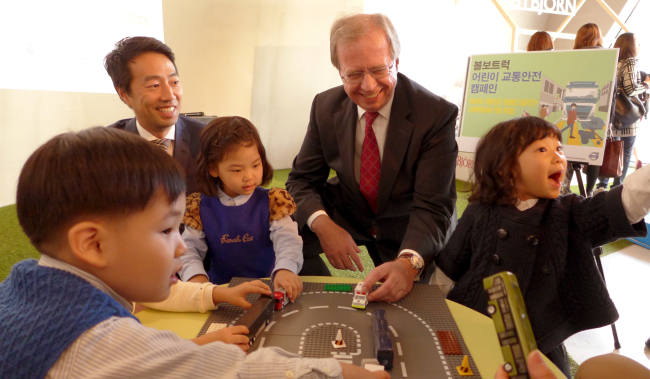Sweden shares wisdom on happy families through equal parenting
By Korea HeraldPublished : Nov. 16, 2014 - 21:13
The Swedish Embassy and Business Sweden cohosted an exhibition on Swedish family life at the“2014 Sweden Kids Week Seoul” at Dongdaemun History and Culture Park, Seoul, from Tuesday to Thursday.
The venue displayed 24 everyday images of Swedish families by photographers Sara Nordangard, Pal Sommelius and Anna Rut Fridholm.
Swedish companies specializing in infant products ― Baby Bjorn, Farg & Form and Libero ― showcased products designed with child-oriented safety features.
The event preceeded the “Swedish-Korean Forum on Work-Family Balance” on Dec. 1 at Seoul Women’s Plaza, to be cohosted by the Swedish Embassy and Seoul Foundation of Women and Family.
“In Sweden, people try to see things from the perspective of children,” said Swedish Ambassador Lars Danielsson. “Fathers and mothers shoulder child-rearing burdens equally.”
The venue displayed 24 everyday images of Swedish families by photographers Sara Nordangard, Pal Sommelius and Anna Rut Fridholm.
Swedish companies specializing in infant products ― Baby Bjorn, Farg & Form and Libero ― showcased products designed with child-oriented safety features.
The event preceeded the “Swedish-Korean Forum on Work-Family Balance” on Dec. 1 at Seoul Women’s Plaza, to be cohosted by the Swedish Embassy and Seoul Foundation of Women and Family.
“In Sweden, people try to see things from the perspective of children,” said Swedish Ambassador Lars Danielsson. “Fathers and mothers shoulder child-rearing burdens equally.”

Coveting the ideals of an egalitarian society, the Swedish government incorporated principles from the United Nations’ Convention on the Rights of the Child into its legislation in 1990. The combined efforts of the Swedish government, society and businesses, with their unwavering faith in the welfare state, have allowed commitments to both family and career.
The parental insurance system was introduced in 1974 as the first comprehensive social security net, guaranteeing 16 months of paid leave at up to 80 percent of regular income ever since. Each parent has to take a minimum of 2 months off work.
All parents of children under 8 years of age are entitled to have 25 percent of their working hours reduced and parents with sick children can use up to 120 days a year while being paid. The local government provides full-time day care services, costing about $200 a month for each child.
The Equality Ombudsman, a government watchdog tasked with eradicating discrimination at work, ensures the lawful provision of holidays by employers.
Even during the financial crisis of the early 1990s, when the government scaled down much of its welfare, the child care services remained, Danielsson stressed.
Children of same-sex couples are called “children from rainbow-families.” According to the Swedish Embassy, their numbers have increased in recent years thanks to rising acceptance by society.
These provisions have given Swedish women the leeway to participate in the labor market parallel to their male counterparts. As a result, Sweden has the highest birthrate among all developed countries, at 1.90 children per woman, and the highest female labor market participation rate between the ages of 18 and 40.
All of these efforts require large amounts of taxes, but having so many working people allows for additional tax revenues, he added.
Danielsson emphasized that the rights bestowed to Swedish families were identically granted to people who have lived in Sweden for two years or more. 15 percent of all Swedish children have one or two of their parents born outside the country, and multicultural families comprise the vibrant mosaic of ethnicities underpinning Swedish society.
Sweden’s commitment in accepting asylum seekers also serves its national interest, Danielsson said. With five times the land mass of South Korea (450,000 square kilometers), but just one-fifth of South Korea’s population (9.7 million), Swedish economy still needs more manpower, he said.
Many immigrants to Sweden are refugees from war-torn countries such as Syria, Somalia and Afghanistan, who are often highly educated and well-qualified. Sweden received 900,000 of them this year alone, the highest per capita figure in Europe.
The Swedish government employs a diverse range of policies and programs to weave them into the social fabric as quickly as possible.
There are of course some racist groups, but they are very much a minority voice, Danielsson said. “What’s important is to be open and transparent about everything, acknowledging that even our relatively well-faring society is far from being perfect.”
Danielsson recalled his experience of being a father 30 years ago in Sweden, when the society was still unaccustomed to the idea of men looking after their children.
“The most crucial aspect was changing the mindset of Swedish men,” Danielsson said. “For Korea to continue the growth it has had over the years, it is imperative to tap into the labor pool of women.”
By Joel Lee (joel@heraldcorp.com)
-
Articles by Korea Herald









![[KH Explains] Hyundai-backed Motional’s struggles deepen as Tesla eyes August robotaxi debut](http://res.heraldm.com/phpwas/restmb_idxmake.php?idx=644&simg=/content/image/2024/05/16/20240516050605_0.jpg&u=20240516155018)









